Hope through healthcare diplomacy
A unique multi-faith partnership between Israelis and Palestinians is inspiring respect and empathy even during the war.
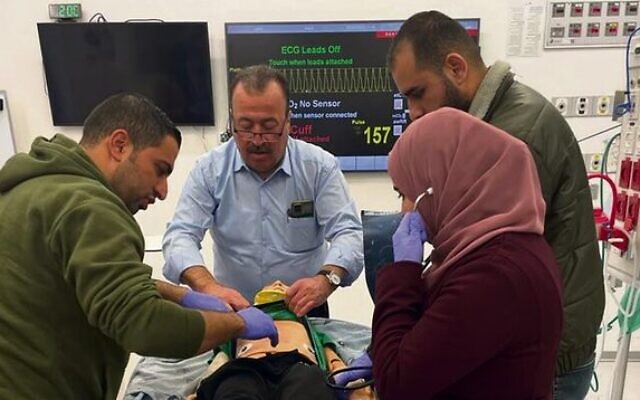
“Everybody knows there is so much potential in this field for Palestinians and Israelis to cooperate, and it can be expanded into other areas,” says Mohammad Asideh.
In the midst of such intense conflict and hostility, any passing flash of hope is understandably latched onto.
Asideh is part of Project Rozana, an international organisation promoting cooperation between Palestinians and Israelis in the field of healthcare. It was established by prominent Australian businessman Ron Finkel and launched in Melbourne in 2013.
Project Rozana was founded after a four-year-old Palestinian girl Rozana Salawhi fell from the ninth floor of her family’s apartment building near Ramallah, sustaining life-threatening injuries. Her mother, journalist Maysa Abu Ghannam, arranged for Rozana’s treatment at Hadassah Medical Centre in Jerusalem, believing that her chances of survival were higher in Israel’s healthcare system.
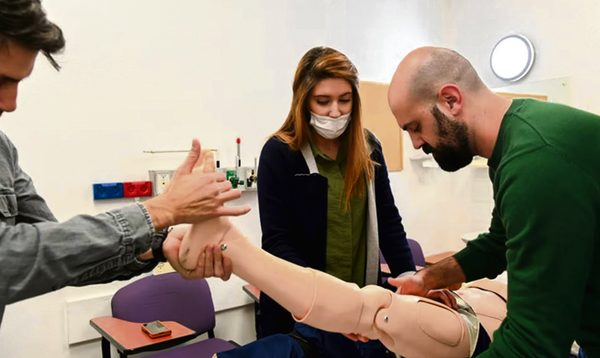
Rozana’s story inspired Finkel to shed light on the significant healthcare disparities between Israel and Palestine, despite their physical proximity. He recognised the potential for healthcare to promote goodwill between Israelis and Palestinians, and decided it was time to take action.
Asideh was introduced to Finkel in 2022 when he moved from the West Bank to Australia so his wife could do her masters degree at Melbourne University.
“It all started from there,” Asideh says, speaking to The AJN from Ramallah.
He was still in Australia when war broke out, having only returned to Ramallah a month ago, and was surprised by how the conflict in the Middle East quickly escalated tensions in Australia, where he spent time meeting with members of both the Jewish and Palestinian communities particularly in the Melbourne suburb of Caulfield.
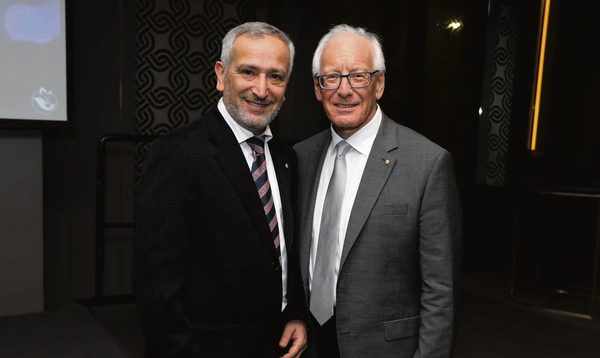
Despite the war, most of Project Rozana’s programs are still continuing – with the exception of its Wheels of Hope initiative in Gaza that, through a network of volunteer drivers, facilitates the journey for thousands of critically ill Palestinian patients, particularly children, for medical treatment at Israeli hospitals. Their last trip was on October 6. Many of the patients on that last ride were stranded in Jerusalem and ended up staying at the hospital longer than needed, with Project Rozana providing additional care and accommodation for them.
One of the biggest tragedies of the October 7 massacre was that no one wanted peaceful coexistence more than the people living on those southern Israel kibbutzim, and no one did more than them to try and achieve that peace.
Project Rozana lost volunteer drivers during the horrific attacks, including peace activist Vivian Silver. The Canadian-Israeli Kibbutz Be’eri resident was initially thought to have been taken hostage to Gaza, but five weeks after the attacks she was declared murdered after her remains were found at her home.
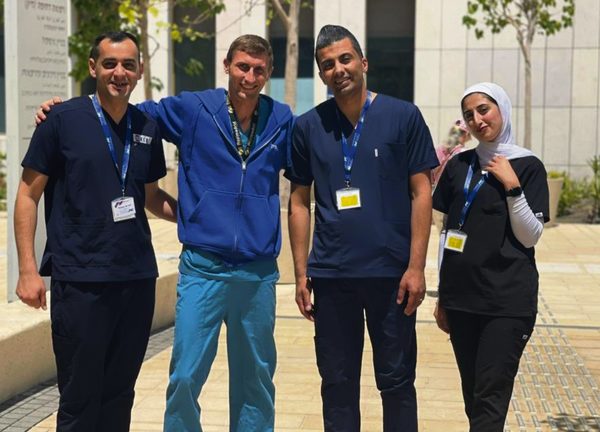
“A woman of infinite, deep, ongoing compassion, humanity and dedication to Arab-Jewish partnership and peace. Yes. Peace,” Anat Saragusti, an Israeli writer and feminist activist, wrote on social media in a post announcing Silver’s death at the time. John Lyndon, the executive director of the Alliance for Middle East Peace, wrote that “she wanted to be free and at peace. Rest in power, Vivian.”
Recently, Project Rozana was able to provide medical supplies to the al-Ahli Hospital in Gaza through the Anglican Church, but that was a once-off with the Gaza–Israel border shut.
After a brief pause, the Nursing Hub has resumed, bringing together 450 Palestinian and Israeli nurses for training. Funded by USAID, Project Rozana’s Nursing Hub addresses nursing gaps in specialist fields.
Chair of Project Rozana Australia Lee Ann Basser says some programs have been adapted, but because they’ve at least been able to continue in the West Bank she says there is some light.
“It’s challenging, but we’re hopeful,” Basser says. “In the nursing program the nurses asked us to provide language education, so the Israeli nurses asked to learn Arabic and the Arabic speaking nurses asked to learn Hebrew. We set up these programs and through the war the nurses on the Palestinian side are continuing to learn Hebrew, and the Israelis are continuing to learn Arabic. To me that’s really hopeful.
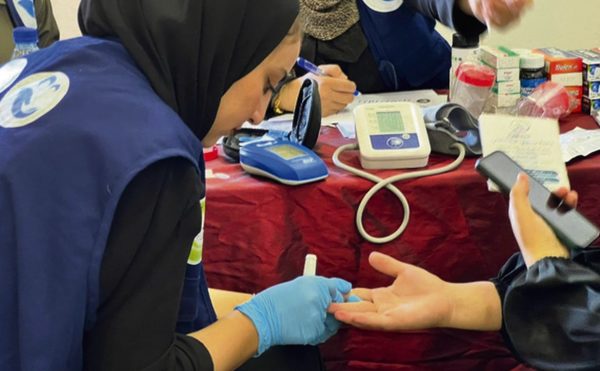
“All the programs have a peace-building component to them. They’re not continuing in the form that we normally would do it which is face to face, but it’s still continuing online.”
Asideh says addressing the mindset of Palestinians and Israelis working together is vital, as he says there is a “tendency to support violence on both sides and a lack of empathy from both sides”.
Like Basser, Asideh is also hopeful the cooperation fostered by Project Rozana can influence public thinking.
“The positive signs have always been there,” Asideh says, adding the little known fact that up to 24 per cent of nurses in Israeli hospitals are Palestinian.
“The problem is not the people. The main problem is leadership failure. We have leaders who have been embracing violence instead of cooperation and that’s where the main problem is. That’s why the work we’re doing in the field of health becomes about how we can take this and make it influential at a political level.
“At the end of the day Rozana is a small organisation, we can’t offer health services on a large scale like other international organisations, but Rozana is trying to take the impact of health cooperation and make it influential to make the case for cooperation and peaceful resolution.”
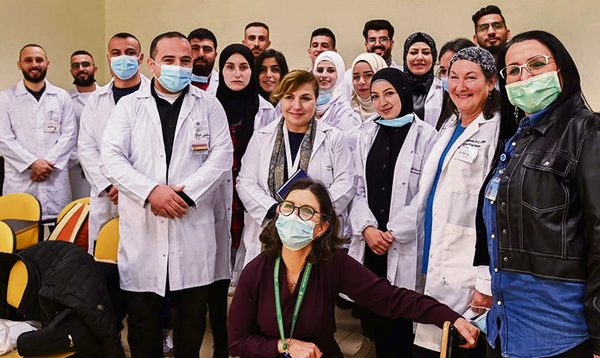
Other programs that have continued to run are Project Rozana’s Women4Women program in the West Bank, whose services Basser says the demand for has “increased four-fold”.
Women4Women provides healthcare for women and children in isolated, rural communities in the Hebron region of Area C in the West Bank.
In addition, Project Rozana’s Palliative Care Initiative launched in December 2023 for a group of 50 physicians, nurses and allied health professionals – Palestinian and Israeli – to gather every week for online palliative care training.
And in February a significant milestone was achieved with the implementation of the joint Palestinian and Israeli Advanced Trauma Life Support (ATLS) course, the first in-person training between Israelis and Palestinians since the start of the war.
Since its inception in December 2021, the collaborative project has been a beacon of hope. It has not only provided vital trauma training to physicians in both communities, but also fostered cooperation among healthcare professionals across borders. Bi-monthly gatherings at Wolfson Medical Centre bring together 10 Palestinian and 10 Israeli physicians, embodying the spirit of health diplomacy.
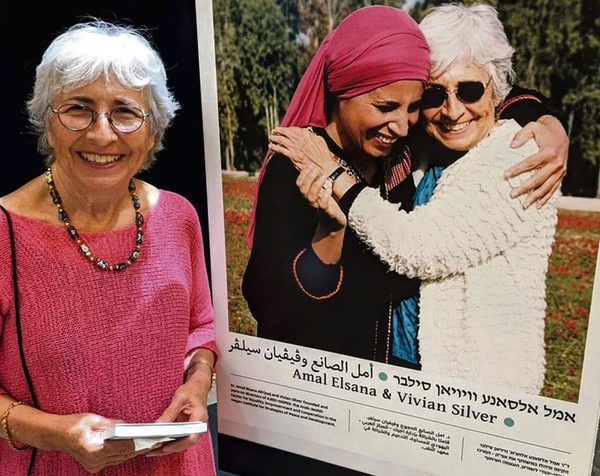
“To adapt to the current situation of border closures, we brought in 10 Palestinian physicians from the East Jerusalem Hospital Network as well as those training at Israeli hospitals, alongside their Israeli counterparts to undertake the course”, says Dr Adam Lee Goldstein, head of trauma at Wolfson Medical Centre, co-founder of Operating Together, and Project Rozana director.
“This collaboration not only showcases a commitment to shared goals, but also serves as a powerful catalyst for peace-building in the region, particularly in the critical field of trauma care during times of conflict.”
Project Rozana’s health diplomacy efforts have been noted by international media outlets, with the organisation’s Australian-born CEO Ronit Zimmer recently featuring on The Deepak Chopra Podcast where she spoke about her diverse team and their reason for hope.
“We have a resilience in terms of our desire for peace, a resilience in terms of our values of respect and empathy and understanding, and I still feel optimistic,” she said.
“Maybe it’s taken 75 years of insanity, it may take another 75 years of insanity, but at some point the brilliant people that live in our region – and there truly are brilliant people who live in Israel and in Palestine and around us – we will be able to come to some kind of solution that demands the kind of courage and creativity that will create a better future for our children.”
Asideh believes most Palestinians support a two-state solution and says Project Rozana’s model of respect and cooperation shows that peace is possible.
“Our ultimate goal is to be able to influence policy and politics around health,” he says.
“There must always be a political solution and building this understanding between Israelis and Palestinians is really important. Palestinians are always interested in living in peace, but the leadership has failed in delivering a solution of two states living side by side in peace.”
Asideh says while there is a “very weak” Palestinian leadership, there “is a partner” there for the Israeli leadership to negotiate with.
With regards to Gaza, Project Rozana is limited in what they can do for now and while Basser admits this period is certainly challenging, she remains optimistic.
“For us we’re working now ‘for the day after’”, she said.
“And we take a lot of hope.”

comments